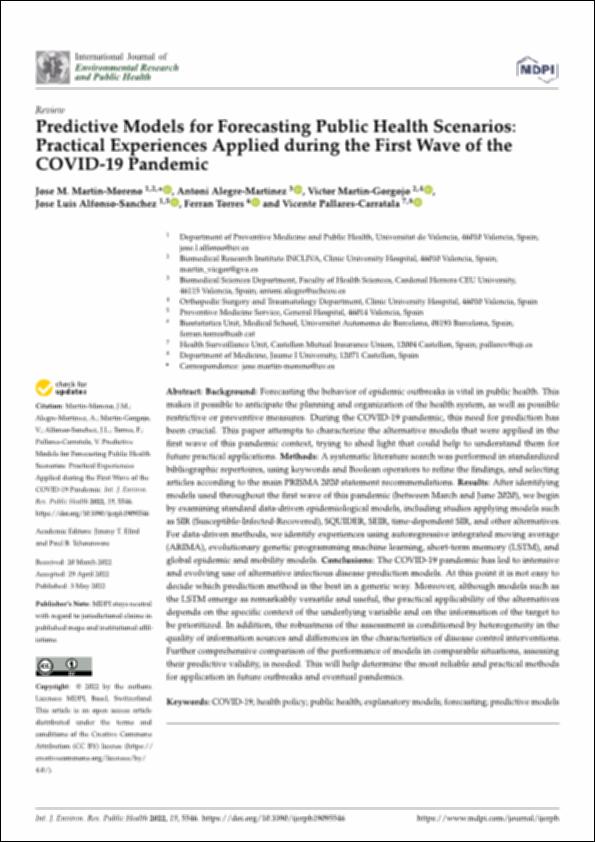Por favor, use este identificador para citar o enlazar este ítem:
http://hdl.handle.net/10637/14160Predictive models for forecasting public health scenarios practical experiences applied during the first wave of the COVID-19 pandemic
| Título : | Predictive models for forecasting public health scenarios practical experiences applied during the first wave of the COVID-19 pandemic |
| Autor : | Martín Moreno, José María Alegre Martínez, Antoni Martín Gorgojo, Víctor Alfonso Sánchez, José L. Torres, Ferrán Pallarés Carratalá, Vicente |
| Materias: | COVID-19 (Disease) - Forecasting.; Public Health - Planning.; COVID-19 - Predicción (Estadística); COVID-19 - Modelos matemáticos.; COVID-19 (Disease) - Mathematical models.; Medical policy.; COVID-19 - Previsión.; Salud pública - Planificación.; Política sanitaria. |
| Editorial : | MDPI |
| Citación : | Martin-Moreno, J. M., Alegre-Martinez, A., Martin-Gorgojo, V., Alfonso-Sanchez, J. L., Torres, F. & Pallares-Carratala, V. (2022). Predictive models for forecasting public health scenarios: practical experiences applied during the first wave of the COVID-19 pandemic. International Journal of Environmental Research and Public Health, vol. 19, i. 9 (03 may.), art. 5546. DOI: https://doi.org/10.3390/ijerph19095546 |
| Resumen : | Background: Forecasting the behavior of epidemic outbreaks is vital in public health. This makes it possible to anticipate the planning and organization of the health system, as well as possible restrictive or preventive measures. During the COVID-19 pandemic, this need for prediction has been crucial. This paper attempts to characterize the alternative models that were applied in the first wave of this pandemic context, trying to shed light that could help to understand them for future practical applications. Methods: A systematic literature search was performed in standardized bibliographic repertoires, using keywords and Boolean operators to refine the findings, and selecting articles according to the main PRISMA 2020 statement recommendations. Results: After identifying models used throughout the first wave of this pandemic (between March and June 2020), we begin by examining standard data-driven epidemiological models, including studies applying models such as SIR (Susceptible-Infected-Recovered), SQUIDER, SEIR, time-dependent SIR, and other alternatives. For data-driven methods, we identify experiences using autoregressive integrated moving average (ARIMA), evolutionary genetic programming machine learning, short-term memory (LSTM), and global epidemic and mobility models. Conclusions: The COVID-19 pandemic has led to intensive and evolving use of alternative infectious disease prediction models. At this point it is not easy to decide which prediction method is the best in a generic way. Moreover, although models such as the LSTM emerge as remarkably versatile and useful, the practical applicability of the alternatives depends on the specific context of the underlying variable and on the information of the target to be prioritized. In addition, the robustness of the assessment is conditioned by heterogeneity in the quality of information sources and differences in the characteristics of disease control interventions. Further comprehensive comparison of the performance of models in comparable situations, assessing their predictive validity, is needed. This will help determine the most reliable and practical methods for application in future outbreaks and eventual pandemics. |
| Descripción : | Este artículo se encuentra disponible en la siguiente URL: https://www.mdpi.com/1660-4601/19/9/5546 Este artículo pertenece la número especial "Exclusive Papers Collection of Editorial Board Members (and Invited Scholars) in Section Public Health Statistics and Risk Assessment". |
| URI : | http://hdl.handle.net/10637/14160 |
| Derechos: | http://creativecommons.org/licenses/by/4.0/deed.es |
| ISSN : | 1661-7827 1660-4601 (Electrónico) |
| Idioma: | es |
| Fecha de publicación : | 3-may-2022 |
| Centro : | Universidad Cardenal Herrera-CEU |
| Aparece en las colecciones: | Dpto. Ciencias Biomédicas |
Los ítems de DSpace están protegidos por copyright, con todos los derechos reservados, a menos que se indique lo contrario.


